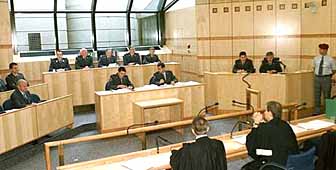Niyonteze appeals trial opens in Geneva

A Swiss military court has begun hearing the appeal of a Rwandan mayor sentenced last year to life in prison for his part in the 1994 genocide. Last year's trial of Fulgence Niyonteze was a landmark.
It was the first to be held outside Rwanda and the International Tribunal for Rwanda in Tanzania. Niyonteze was tried in Switzerland because he had sought asylum here soon after the genocide and before he was identified as a war crimes suspect.
Niyonteze’s lawyers are calling for their client to be acquitted. “The guilty verdict was based on accusations that haven’t been established as fact,” said Vincent Spira, from Niyonteze’s legal team. “The eye-witness evidence wasn’t credible. Our client benefitted from no extenuating circumstances.”
The 35-year-old former mayor was found guilty of murder, attempted murder, incitement to murder and war crimes. Earlier in the trial, the charges of genocide and crimes against humanity were dropped, when the court ruled they could not be heard under Swiss law.
More than 40 witnesses were flown to Switzerland for the original trial in Lausanne. Many more were interviewed in Rwanda. Several gave harrowing testimony that the then mayor of the village of Mushubati, some 50 kilometres south-west of Kigali, had convened a meeting at which he incited people to kill Tutsis and moderate Hutus.
Some said he ordered the killing of Hutu women married to or made pregnant by Tutsi men. One man told how he had been beaten and left for dead on the orders of the accused.
The number of witnesses travelling to Geneva for the appeal is expected to be far fewer than during the trial. Some of the witnesses have given additional information to their statements that was not heard last year.
The appeals hearing is expected to last about two weeks.
Niyonteze denies the accusations against him. He argues that he called the meeting on Mount Mushubati to discuss how to combat the activities of bandits and illegal loggers.
The International Tribunal in Arusha made no request to have him extradited, and a request from Rwanda was turned down because of that country’s use of the death penalty. He therefore became the first Rwandan war crimes suspect to be tried outside the Arusha Tribunal or Rwanda.
An eighth war criminal is due to be sentenced this week by the tribunal in Arusha. It is holding another 44 and says it is still looking for up to 100 more.
“In relation to the number of people wanted, the number of people sentenced is small, and the criticism from Rwanda is that the tribunal spends too much money and doesn’t move fast enough,” says Julia Crawford, a journalist who covers the proceedings in Arusha for the Lausanne-based Hirondelle Foundation.
“But the tribunal is a court that operates under strict international standards. The maximum sentence is life imprisonment, whereas in Rwanda, the courts can and do impose the death penalty. Amnesty International recently issued a report saying that some of the trials in Rwanda had not been fair and expressed concern at the excessive use of the death sentence,” Crawford told swissinfo.
She also said that the international tribunal had to make an effort to fulfil its mandate of promoting reconciliation.
“So far, only Hutu suspects have been investigated and tried. And there’s growing pressure on the tribunal to investigate crimes against humanity committed by Tutsis, especially prominent ones,” she said. “Many people feel that it’s not until it begins to investigate serious crimes by both sides that people – notably the majority Hutu population – will feel something is really being done for reconciliation.”
by Roy Probert

In compliance with the JTI standards
More: SWI swissinfo.ch certified by the Journalism Trust Initiative
You can find an overview of ongoing debates with our journalists here. Please join us!
If you want to start a conversation about a topic raised in this article or want to report factual errors, email us at english@swissinfo.ch.